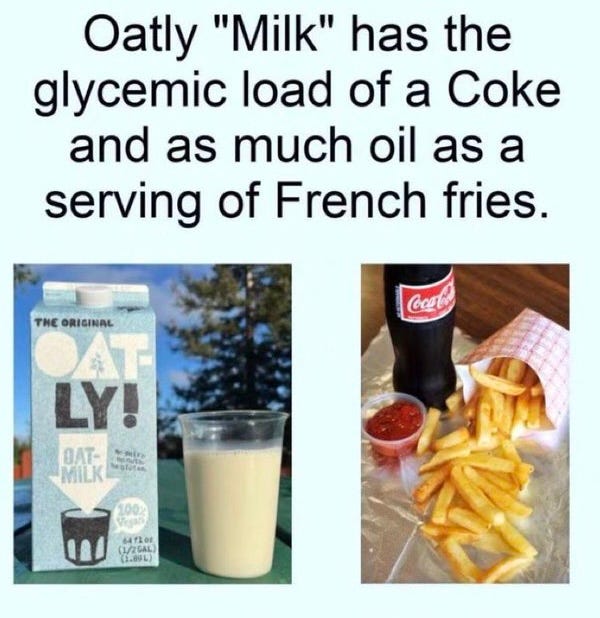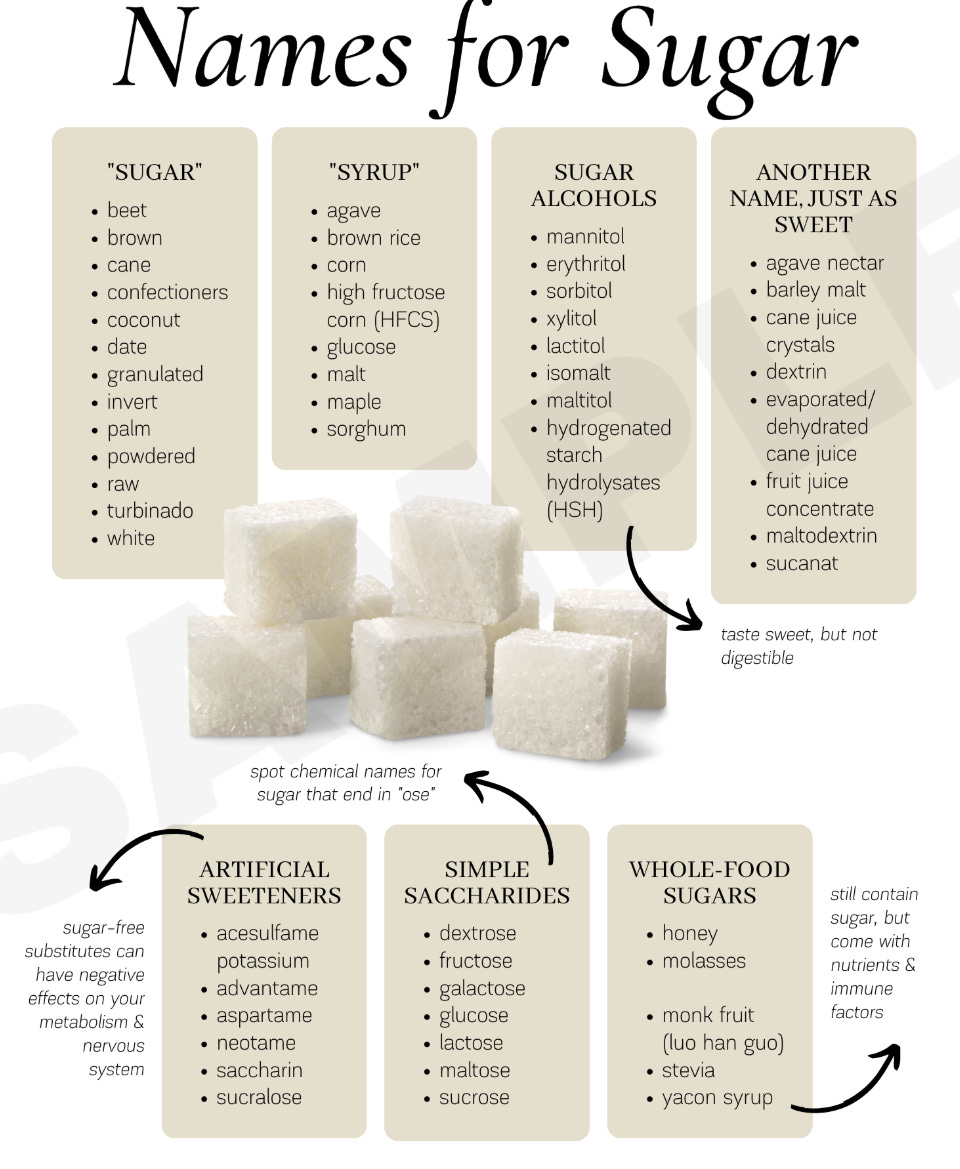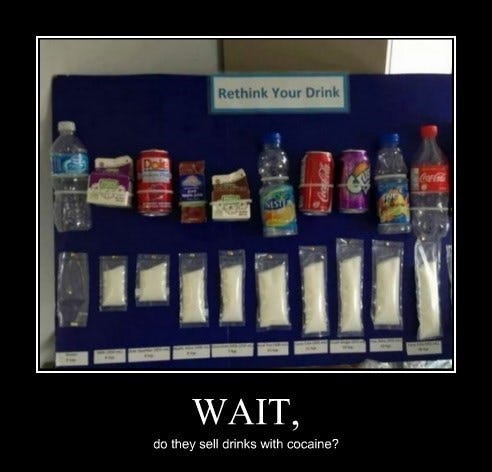7 Things You Don't Want to Hear About the Food You Eat
Don't stick your head in the sand. Be informed.
The supermarket is not a safe place.
It’s a jungle full of danger, with poisonous berries and other things you shouldn’t eat. And snakes in the grass.
It’s a high-pressure sales environment where corporations are out to take all of your money. They sell you products disguised as safe snacks that will slowly give you dementia and take away your last 10 birthdays.
But hey, they don’t mean any harm…
It’s a casino, where the house wants to hook you on the slot machines and suck you dry. But you’re betting with your health.
It’s up to you to wake up and start paying attention. It starts with awareness.
Do you think that food companies are on your side and would never do anything that could hurt you? Or are they out to make as much money as possible, no matter who they have to screw over?
1. Vegetable Oil is In Everything
Vegetable or seed oil is not good for you. Many of us are aware that we should avoid it. But it isn’t enough to just stop cooking with it at home. We also need to avoid foods that are made from it.
Food companies figured out how to use these dangerous oils in almost everything. They do it because it’s cheap and shelf-stable.
Oat milk
Granola bars
Mayonnaise
Salad Dressing
Fake cheese
Fake meat
Potato chips
Fries
Cookies
Crackers
Almost everything in the center aisles of the supermarket
2. Bread, Potatoes, Rice, and ALL Carbs Turn Into Sugar Inside You
We all know that too much sugar harms your health. What we don’t consider is that bread and potatoes are, basically, sugar.
This means it isn’t enough to tone down on the candy, cookies, ice cream, and soda pop. What about having bread 3 times a day, extra servings of mashed potatoes or rice, and snacks like potato chips or crackers?
Newsflash: This all turns into glucose inside you.
That’s not all. The food industry stashes extra sugar in food by using different names for it, so even if you read the label, you might get tricked. They do this to make everything unnaturally tasty, and that hooks your body, just like you took street drugs.
3. Gluten-Free DOES NOT Mean Healthy
The most effective way for a food company to generate substantial profits is to sell inexpensive, ultra-processed foods that remain stable on the shelf for years without refrigeration. It’s even better if those products can masquerade as health foods.
Gluten-free bullshit-snacks are just one example.
Read more about that with Christina Heiser below.
4. Fat-Free Flavoured Yogurt is Dessert, Not a Meal
Check out what’s in that yogurt you’re having for breakfast. You might be just as well off eating donuts or chocolate bars. And if they stripped all of the fat out of it, then it’s mostly empty calories.
Why would we even want to eat fat-free anything?
Fat is not the enemy. Sugar is so much worse for you than fat ever was.
5. Whole Wheat Is Not Healthier Than White Bread
This is one of the biggest tricks in the “Trick the Consumer” book. Whole wheat foods are usually ultra-processed foods. And whole wheat may even contain more anti-nutrients than white bread does.
Corpo Boss: We need to squeeze more profit out of this grain. Blah Blah Blah profits! How can we suck more money out of these losers, I mean, customers?
Corpo Lackey: What if we didn’t throw away the husks and bran? We can save money on waste and bulk up the bread. The consumer will eat it up because brown bread looks healthier.
Thoughtful Employee: The husk has no nutritional value. People shouldn’t eat that. In fact, it contains more lectins and phytates that can cause a lot of problems for some people.
Corpo Boss: Corpo Lackey, start grinding up that junk and add it to the bread.
Corpo Lackey: And we can call it “whole wheat” because we use the whole thing!
Thoughtful Employee: But if you grind it up into fine powder, it’s ultraprocessed. It’s not whole. Whole means the opposite of tiny little pieces.
Corpo Boss: Thoughtful Employee, you’re fired! Corpo Lackey, you get a raise!
6. Plant-Based Doesn’t Mean Plants. It Means Processed.
Take a look at margarine. Does it look like a plant?
How about “vegetable” oil? See any vegetables?
No? Huh. Could it be that this is a marketing trick?
The following list has one thing in common, and it isn’t plants:
Plant-based “meat”
Oat “milk”
“Plant butter”
Plant-based “eggs”
Plant-based “cheese”
Can you guess what the common element is?
These are all ultra-processed foods. A diet consisting of plenty of these things is not healthy.
A true plant-based diet would involve eating food that resembles a plant, typically something that requires preparation and cutting. It wouldn’t come in a package that could sit on a shelf for 100 years without rotting.
7. Oat Beverage is Not a Good Alternative to Milk
You might notice some new signs around town, advertising the latest thing at McDonald’s: Oat beverage Now Available.
This is yet more bullshit going into our bodies to muck things up.
I’m sticking to my guns on this one. Even though I love the taste of oat “milk.”
Ingredients in real milk:
Milk
Vitamin A Palmitate
Synthetic Vitamin D
Ingredients in oat “milk” (otherwise known as Fake Milk):
Oat base (filtered water, oat concentrate, amylase, glucanase)
Vegetable oil
calcium carbonate
zinc gluconate
Vitamin A palmitate
riboflavin [B2]
Synthetic Vitamin D2
Synthetic Vitamin B12
Dipotassium phosphate,
Salt
Gellan gum
Ascorbic acid
Let’s break that down a bit.
Real Milk has very few ingredients—naturally occurring animal milk, and a few added vitamins.
Fake Milk has 15 ingredients, with multiple artificial ingredients. In this example, vegetable oil is the second ingredient. It might as well be margarine or cooking oil.
So next time you ask for oat milk, consider what you’re putting in that coffee.
Think almond milk is better? Check that ingredient list…
Do Any Of The Things on This List Surprise You?
Are you hooked on any of these unhealthy fake foods?
Ask yourself the question: Do you have any health problems that don’t have an identifiable cause, like headaches, stomach distress, aches, and pains?
That health problem might be caused by an additive, chemical, or substance in what you eat. There’s a good chance of it.
Alternatively, it could be an effect of chronic inflammation resulting from the high levels of insulin caused by consuming processed carbohydrates.
Read those labels, people. Consider what you are putting into your body. Health is created or destroyed by the foods you choose.









Okay, I have a couple to comment on. First, whole wheat bread. You're just talkin brown bread, right? Because I buy fresh bakery bread (usually sour dough) with a shit ton of visible seeds in it. That's what I call whole wheat or "seedy" bread. I refuse to believe it's bad for me.
Next, nobody is going to tell me that I shouldn't be eating potatoes. Sugar or not, it is an organic piece of food that grows out of the ground. And it's caloric density makes it a great staple because it fills you up with fewer calories.
Finally, MILK. I get it. Milk is good for us but I just cannot make myself drink a product that has another animal's pus in it 🤮 I don't drink oat milk either because the first time I bought it to put in my coffee I could see the oil floating on top of my coffee.
Hey Tim,
It`s crazy how much value you put into this article.
Supermarkets should have a sign: "Enter at your own risk." or "Trespassing this building might jeopardize your health."
Being pretty informed about nutrition myself I was happily surprised (or shall I say shocked) I learned a few things, seasoned with your ironic tone, which is always a pleasure to read.
So no Oatmilk there, I`m an almond milk drinker, but I have a feeling that this might be just as bad - how about the oil in there?